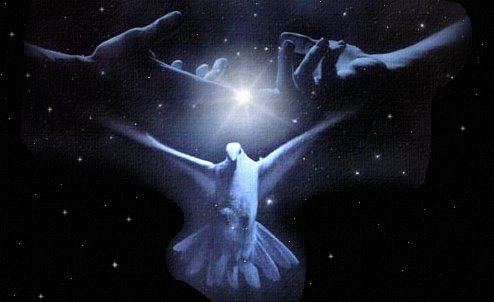|

The Lord from
Eternity

By the Rev. David Sonmor
John
17:1-24.
Isaiah 25.
Doctrine of the Lord 21, 29&30.
The
idea that the Lord existed from eternity can be a bit confusing if not
understood in a certain light. Christians think of the Lord as being
Jesus Christ the Son of God, the Savior who can be seen and understood
in human terms; the God with whom we can have a personal relationship
because we can read about the perfect human life that He lived here on
earth and we can relate our own lives to the kind of things he did and
the kind of physical and emotional pain he experienced. We tend though,
to limit our concept of "Lord" to the thirty year period in
which he lived a natural life, and how that life was recorded in the
Gospels.. We tend to keep our memory of the natural man foremost in our
thoughts about Him. That is a natural thing for us to do.
In
truth the idea or concept of the Lord in the holy scriptures does not
begin with the birth of Jesus but begins in the second verse of Genesis
Chapter 1. "In the day that the Lord God made the heavens and the
earth." And then He is often referred to simply the Lord. This
mixed usage is scattered throughout the Genesis story and continues on
throughout the Old and New Testaments. The names El (Eli), Jahweh
(Jehovah) and Adonai (Lord) and contractions of them such as Jah and
Adoni all speak of the same one God, who is at the same time Creator,
Redeemer and Savior. The object of this mixed usage is not to show that
God is more important than Lord or is prior to Lord in some divine
hierarchy, but is rather to demonstrate that the aspect of God that
relates to people is prominent in scripture primarily because the Word
was written for the benefit of people, and specifically to help them
understand God and His Kingdom, which is the whole object and purpose of
the Word.
Yahweh
is the unpronounceable name of God who is unseen and is incomprehensible
to the human mind. It is the Divine, the uncreated being who existed
before creation; The Creator. The words El and Adonai, in Hebrew, are
used to identify the God or the aspects of God that we, with our limited
capabilities, are able to comprehend. El is interpreted as God and is
used to describe Yahweh as the object of worship and as the mighty one.
Adonai is translated as Lord, and is used to describe God as master or
king or leader who acts in concert with his people. In other words God
who relates to man. This is not a separate God from the Creator, it is
simply an aspect of the Divine that is reduced to a form that human
intelligence can understand and relate to.
The
Doctrine of the Lord indicates that, "The Lord from eternity is
Jehovah." and that "The Lord from eternity assumed the human
in order to save mankind." The Lord aspect of God (the unknowable
Divine), reduced itself to the natural form (Jesus), in order to prevent
the human race from destroying itself. I like to use Swedenborg's term
"the Divine Human" to describe the brief period that the Lord
walked in a physical body on this earth because it indicates that the
Divine was in that human body. It is not difficult to see how that body,
at the time of resurrection became one with the Divine which was its
soul.
The
story in Luke Chapter 24 attests to the fact that Jesus was indeed the
Lord God when he explained to the two men on the road to Emmaus, "…
beginning with Moses and with all the Prophets, He explained the things
concerning Himself in all the Scriptures."
The
passage from Isaiah 25 shows that the Hebrews felt the presence or
spirit of the Lord with them during their troubled times of establishing
control of the land they felt entitled to own and in their continuing
struggle to keep that land. Also in the notion that the Lord as Messiah
would eventually appear more clearly to them and establish a lasting
stability in the lives of all people: "On this mountain the Lord of
hosts will make for all peoples a lavish feast, a banquet of aged wines
on the lees, choice pieces with marrow, and refined wine. And on this
mountain He will swallow up the covering which is over all peoples, even
the veil that is spread over all nations. He will swallow up death
forever, and the Lord God will wipe away all tears from all faces, and
the reproach of His people he will take away from all the earth; for the
Lord has spoken." The mountain denotes love to the Lord. They who
are in this love dwell with the Lord in good and truth, which is
signified by the "feast." The choice meat full of marrow are
goods; the sweet refined wines are the truths that come from those
goods. (AC 2341).And further: "A 'feast' denotes heaven and
conjunction there with the angels through love and charity; 'choice
things' are the goods of love and of charity." (AC 5943.7). Wines
are the truths that come from that love. The 'lees' is the sediment or
dregs that are separated from the wine so they correspond to all the
falsity that is to be separated from the truth so that it will be clear
and palatable.
With
respect to the coming of the Lord and the development of a new church it
is said that the covering cast over the peoples and the veil over the
nations will be removed. The peoples represent the truth that will be
revealed and the nations represent the goods that will come into being
when the coverings of evil and falsity are removed.
The
Lord, who has existed from eternity, will bring this about, according to
the prophet Isaiah. How beautifully this fits with the prophecy of the
New Jerusalem or New Church, which we get from the Book of Revelation
and the writings of our church.
The Lord existing from eternity is also identified in our reading from the Gospel of John and can help us to, further understand the full meaning of the resurrection of Jesus and the glorification of his body so that it became one with the father or the Divine: When Jesus had spoken these words, he lifted up his eyes to heaven and said, "Father, the hour has come; glorify Thy Son that the Son may glorify Thee, even as Thou gavest him authority over all mankind to give eternal life to all whom thou hast given him. And this is eternal life, that they know thee as the only true God, and Jesus Christ whom Thou hast sent. I glorified Thee on the earth, having accomplished the work whichThou hast given Me to do. And now glorify Thou Me together with Thyself, Father, with the glory which I had with Thee before the world was..(John 17.1-5) The reason it is said that the father will glorify the son and the son will glorify the father is because the union of the two aspects of God was reciprocal and mutual. This is also why it was previously said by Jesus that, "I am in the father and the father in me; I and the father are one." And "All mine are thine and thine are mine." He also, identifies here that he, The Lord, ex.isted from eternity, "Glorify me with the glc-ry I had with thee before the world was made." In the Doctrine of the Lord paragraph 5 it states, "As the Lords Human was glorified, that is, made Divine, He rose again after death on the third day with His whole body, which does not take place with any of us; for a person rises again solely as to the spirit, and not as to the body. In order that we may know and not doubt that He rose again with His whole body, He not only said so through the angels at the sepulchre, but also showed Himself to His disciples in His human body."
Doctrine of the Lord, paragraph 30:
That THE LORD FROM ETERNITY IS JEHOVAH is known from the Word, for the Lord said to the Jews, Verily, verily, I say unto you, before Abraham was born I am. ( John viii 58); and elsewhere, O Father, glorify thou me with the glory which I had with thee before the world was. ( John xvii 5.) By this is meant the Lord from eternity, and not a Son from eternity; for the Son is His Human, conceived of Jehovah the Father and born of the Virgin Mary in time. That the Lord from eternity is Jehovah Himself appears from many passages in the Word, of which only these few will be adduced at present:
It shall be said in that day, This is our God; we have waited for Him that He may save us. This is Jehovah; we have waited for Him, we will be glad and rejoice in His salvation.( Isaiah xxv 9.)
From these words it is evident that God Himself, even Jehovah, was waited for:
The voice of him that crieth in the wilderness, Prepare ye the way of Jehovah, make straight in the desert a highway for our God. The glory of Jehovah shall be revealed, and all flesh shall see it together.
Here also the Lord who was to come is called Jehovah. I, Jehovah… will give thee for a covenant to the people, for a light of the Gentiles ... The covenant to the people, and the light of the Gentiles is the Lord as to the Human. Because this is from Jehovah, and was made one with Jehovah, it is said, I am Jehovah; that is my name, and my glory will I not give to another; that is, to no other than to Himself. To give glory is to glorify, or to unite to Himself.
The Dayspring from on high hath visited us. Luke
1: 78. The Dayspring from on high, also, is Jehovah, or the Lord from eternity.
The teachings of the New Church emphasize over and over again that God is One and there is only One God. The Father, Son and Holy Spirit are words or names used to describe certain aspects or manifestations or characteristics of the One God. The Church teachings also use the terms Divine Love, Divine Wisdom and the Divine Proceeding as words synonymous with Father, Son and Holy Spirit. The Divine Proceeding is God manifesting Himself though creation of the physical universe which includes our Earth and everything in it. The Divine proceeding also maintains communication and relationship with the human race through our ability to understand and relate to the ideas of the Lord, the spirit, Jesus Christ and The Word. as He has presented it to all people of all generations for all eternity.
 

 

©Danny Hahlbohm, used with permission
Painting entitled Trinity
Music:
Prism: Color of Love
©Bruce DeBoer and used with permission

|